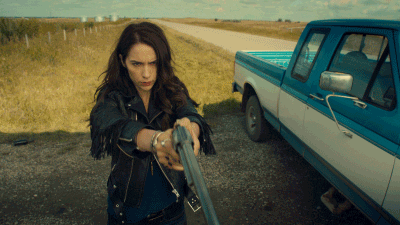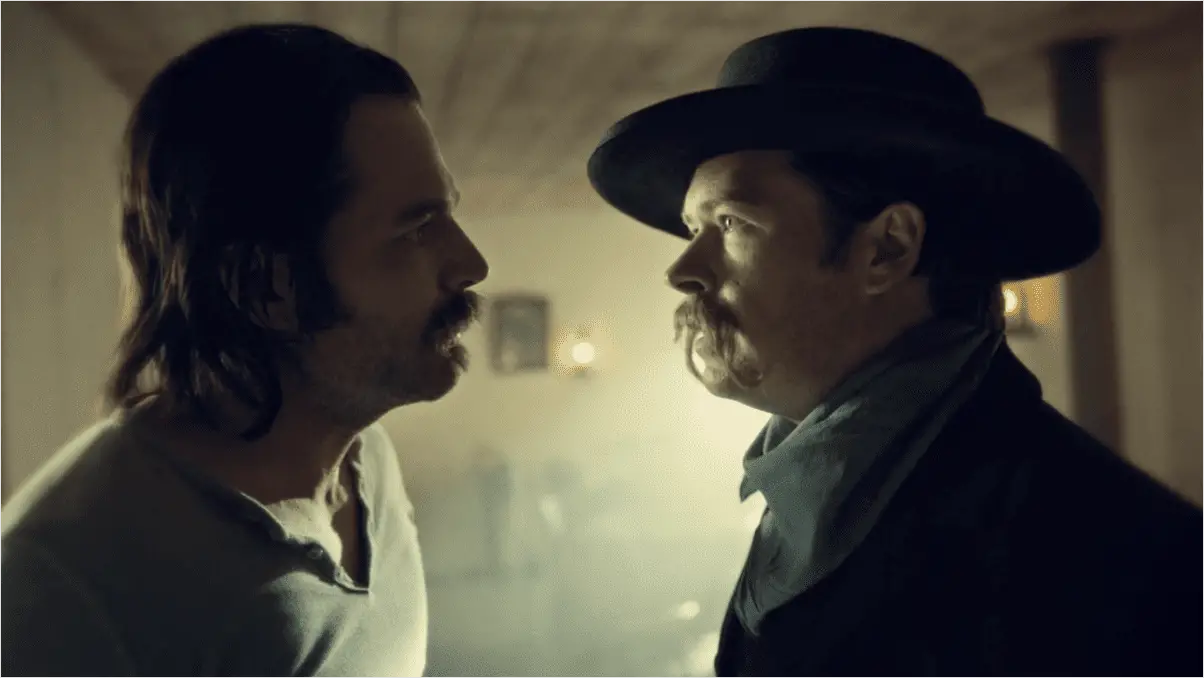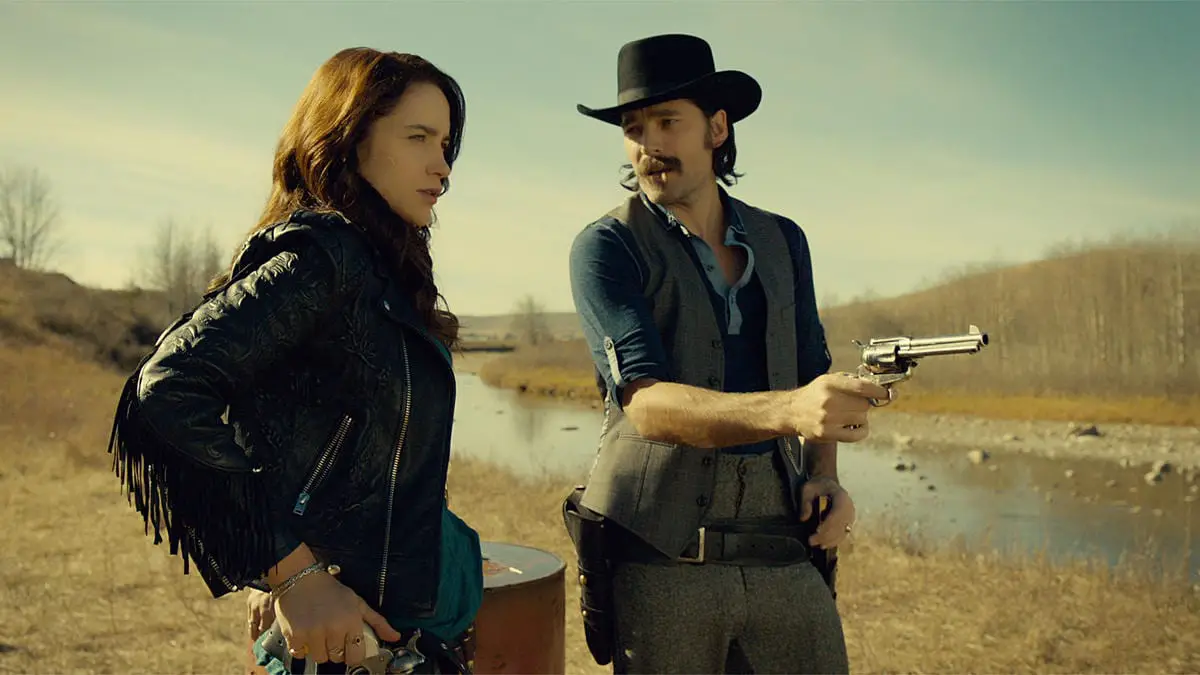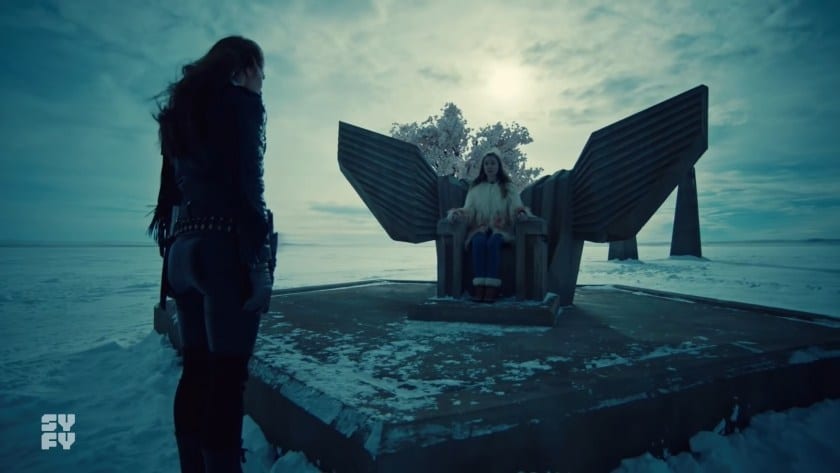One of the silver linings of this very strange year has been the return of Wynonna Earp with its fourth season, which opened with a bang and continues to keep fans on their toes.
As Earpers enjoy their hard-earned demon-y fun (and angst), I thought this was a great time for some musings about the series, which has proved to have significance beyond itself.
The Disappearance of the Gun
At the end of the third season, the curse that had bound the Earp heirs to a destiny of killing the same 77 revenants over and over, is broken. And with the curse, the revenant-killing weapon, Peackemaker, also disappears, leaving Wynonna (Melanie Scrofano) seemingly powerless against the new demonic threats that keep coming at her.
As of the time I’m writing this article, the gun has not reemerged, and Wynonna’s need for it has only intensified.
Peacemaker has always held significance in the story and lore of the show by virtue of being the only weapon capable to getting that demon-killing job done. Also, because it was Wyatt Earp’s gun, passed down to generations of his cursed heirs.

But beyond the Watsonian confines of the story world, there is also a lot to talk about what a gun represents. Wynonna Earp is a fantasy, but it is also a Western. It uses its iconography and even some of its characters. Wyatt Earp is one of the quintessential figures of the Western.
Wynonna is a direct heir of one of the greatest Western legends, his power bestowed upon her fully and validated by the narrative again and again. In a way, she has power because of Wyatt Earp, though his legacy does not go unquestioned. So, what happens when she loses that symbol of power?
I know a lot of fans bemoan the loss of Peacemaker, but I find it delicious, and part of me hopes they do not get it back. To explain why, I need to talk about Westerns.
Westerns and Men
I was never a fan of Westerns. I sat through many of them for the sake of film classes, but I never felt I clicked with the genre, even though there are aspects of it that I find appealing (the aesthetic, for example). I wanted to like them, though, or at least understand them, so when an opportunity came, I set picked them as an essay topic, to make myself study them more deeply.
What I discovered is that Westerns, especially in classic Hollywood, are a bit of a boy’s club. Their themes revolve around what it means to be a man. At their core, many of these stories are an exploration and even celebration of a certain type of masculinity. That is not to say there aren’t exceptions, and there have been examples of women-led Westerns throughout history.
The gun is often a key component of this exploration of masculinity. The gun often represents a man’s power. In Westerns, it is how men assert their dominance, often over other types of physical violence. The act of putting hand over the holster, drawing it on an opponent is woven into the iconography of the genre.
Westerns and Wynonna
Wynonna Earp is a fascinating show to study in its relation to the classic Western because it is both an homage and a challenge of the conventions of the genre.
The show looks back at Wyatt’s time with a certain bit of nostalgia, painting him as a good, honorable man. Hell Heaven, in season 3 it was revealed he was chosen by an angel to be his champion. But in its romanticizing of Wyatt Earp, the show also challenges the portrayal of the quintessential Western hero.
Western protagonists are (usually) the stoic type. Silent, often gruff men, righteous but rough around the edges who have a hard time fitting in with society. Wynonna’s Wyatt Earp is, to put it bluntly, a soft cinnamon roll. The few times he appears on screen he is portrayed as earnest, open with his feelings, and even affectionate. Wyatt was a righteous man, a great gunslinger, but also an emotional man.

His friend Doc Holliday (Tim Rozon) fits more neatly into the Western hero archetype, he is even a man out of time. However, the narrative does not reward it, and instead he is forced to change, adapt, and to apologize when he screws up.
Even though he does conform more than Wyatt, Doc is also a bit too soft and goofy. On top of that, there is the fact that the show has neither confirmed nor denied that Wyatt and he were boyfriends. They have flirted with the idea that both men may be bisexual since season one, and I for one, would love to see it confirmed.
These are just the two most prominent examples of how the show reframes Old Wild West, which is the de-facto setting for the genre (though in its evolution, the possibilities have opened).
Wynonna herself both fits and completely crushes the stereotypes, starting with the fact that she is a woman. Throughout the history of the genre, there have been precious few women at the helm, and even then, they are often framed differently. This is of course changing, with the likes of Westworld and Godless.

Our resident Earp heir shares some of the typical lead’s characteristics: a lone wolf who doesn’t fit in, rough around the edges, resorts to violence to solve her problems. She’s “tougher” in the traditional sense than Wyatt as, as far as we’ve seen. She is also funny and fun, sexually “liberated” without being vilified for it, but she is not a typical “strong woman” that just gets stacked with male-coded characteristics. She also gets to be soft, sensitive and emotional.
“You know, for a lone wolf you’re awfully needy” – Waverly Earp
She also deviates from her ancestors (both in-world and in-genre) by staying. While the classic Western hero often leaves at the end of the movie, having saved the town but still not fitting in, Wynonna is very much rooted in Purgatory. She finds a pack and sticks with them, if reluctantly at first. She had a moment of weakness at the end of Season 3, where she drugged her friends in order to go (almost) alone into battle, but that’s pretty much it.
The narrative doesn’t let her get away with it, and she is quick—if you don’t count the 2 real-life years the fans waited for it—to recognize it as a mistake. Upon her return to screen, Wynonna finally admits to herself that she needs her friends and family around her, and then she admits it to everyone around her, too. This represents a growth in Wynonna, but also a growth in the genre, in my opinion.
Wynonna and Masculinity
Westerns have long been about “what it means to be a man,” and Wynonna Earp constantly explores this theme, quietly. Its portrayal of Wyatt and Doc is a reexamination of manhood, and in the show, it is they who bestow and later validate Wynonna’s power and her right to be the hero of this crazy fantasy Western story.
Wynonna Earp revises the narrative about the men of the past, reframing them, and in doing so also says much about what it means to be a man today. As I see it, the exploration of masculinity today (at least in media) is in some ways about reevaluating their place in relation to women and taking conscious action to give women the space they have been denied to define themselves.
Doc does this big time, and Dolls, who is ultimately the more stoic of the main men, mellows out quickly as a direct result of giving Wynonna space to grow.
Of course, Wynonna Earp is not about men. It is very much about Wynonna as a person first, and as a woman, sister, daughter, mother, and friend. All the above is just a byproduct I find immensely interesting which has been present since the first season, whether it was intentional or not, and which has a heavy weight in this article.
Wynonna’s relationship to Peacemaker is inherently linked to her relationships with the men of the past, whose presence has always weighed heavy on her, both physical and spiritual. Namely, Doc, Julian/Juan Carlo and of course, Wyatt.
Where Does Peacemaker Come In?
Peacemaker is a physical representation of Wyatt Earp’s legacy, both as a famous gunslinger and as a cursed champion of angels. It has a duality in the narrative: its presence gives Wynonna power, but it is also a huge factor in what makes her cursed.
Wynonna starts the show as a pariah in her hometown, haunted by the ghosts of her past. She was the crazy one who always talked about demons and no one believed her. Peacemaker was a symbol of that dark past. She killed her father with it by accident, which tainted it for her. Retrieving it and mastering its powers however, is what empowered her to right her wrongs and find a place in the world.
Wyatt passes on the power, the validity of her role as the hero of this story. She is the only one who can use Peacemaker because she is a direct descendent of “the greatest gunslinger that ever lived.” Later, Doc Holliday validates her place by teaching her to shoot.

Doc is also content to play sidekick to Wynonna once he is fully on her team. Ultimately, Wynonna manages to surpass Wyatt as a gunslinger and as a demon hunter, as she finishes his job, finally defeating Bulshar.
“She is ten times the gunslinger Wyatt ever was.”
And so, just as Wynonna finishes Wyatt’s work, she loses Peacemaker.
Without it, Wynonna thinks like she cannot be a demon hunter anymore. This reveals that she feels and has always felt that her “magic gun” is what made her special. It was the gun that gave her confidence in her power, despite her constant doubts about her personal quality as a hero (see: drugging her friends because she fears failing them and being unable to protect them).
And that is why I not so secretly wish Wynonna won’t recover Peacemaker.
The gun is cool when it shines and everything, but it doesn’t stop being a direct symbol of a man’s power. Remember, the gun in the classic Western is representative of men’s power and the way they wield it in the society of the Wild West. Peacemaker was Wyatt’s, the special power it has came about because and for Wyatt, power that is Wynonna’s because Wyatt passed it on to her.
I believe the show has a chance to make a point here. There is nothing wrong with the fact that Wynonna’s “specialness” and power is initially the inheritance of a powerful man. In a way, that reflects something true. For the powerless to get empowered, often someone in the ruling class has to pass it down, lend their space and platform. That is what Wyatt and Doc have done for Wynonna.
However, after that, it is time for that newly empowered group to redefine their role in that new space, which doesn’t necessarily have to look exactly like the one left by the enabler. Wynonna isn’t special because she is the Earp heir and has a magic gun; those were just the tools that enabled her to find herself and discover who she wants to be in and for the world.
Destiny Be Damned

The show does seem to be going that route, represented with Wynonna talking her baby sister Waverly (Dominique Provost-Chalkley) off her father’s throne.
“All this destiny, cursed fate, heirs of anything bullshit is cancelled.” – Wynonna
Of course, for Wynonna, Peacemaker is a bit of a safety blanket, so she wants it back. And it looks cool and is iconic, so most Earpers want it back (and probable Melanie Scrofano does, too). And who knows, maybe by the time this goes out into the world she’s already recovered it. I do have the hope that she gets the chance to at least reframe/redefine it in her own way. Or even better, make herself her own cool gun that shines, with the help of her half-anger sister.
Perhaps it is time for Wynonna and Waverly to decisively denounce the legacies of the men who bound them to destinies they did not ask for and redefine those roles for themselves. Do the demon-hunting and the Eve-trapping their own way. Maybe they could even forge their own weapons, with their band of weirdos by their side.
Maybe this is a bit far-out, and bear in mind these are the musings of someone who spends entirely too much time thinking about television, but I think that would be awesome. All 2000-ish words of that said, I won’t complain if they do find Peacemaker, I just think losing it forever could prove meaningful in more than one way.
Images courtesy of Syfy/NBC Universal

